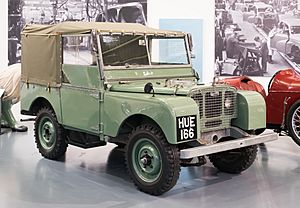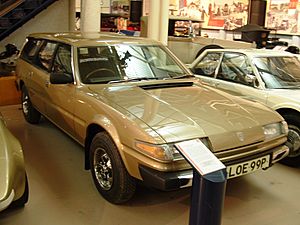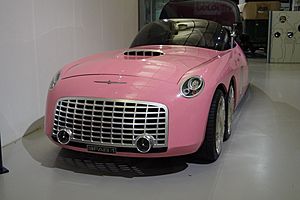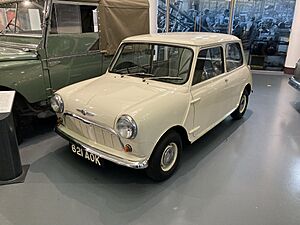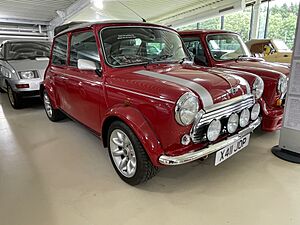British Motor Museum facts for kids
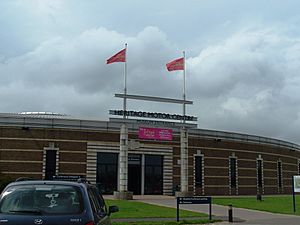 |
|
| Established | 1993 |
|---|---|
| Location | Banbury Road, Gaydon, Warwickshire, England |
| Type | Transport Museum |
| Nearest car park | On-Site Parking which is free |
The British Motor Museum is a super cool place in Gaydon, Warwickshire, England. It has the world's biggest collection of old British cars! You can see over 300 amazing cars there. These cars come from two special groups: the British Motor Industry Heritage Trust and the Jaguar Heritage Trust. It's a fantastic spot to learn about the history of cars made in Britain.
Contents
The Museum's Story
How the Car Collection Started
Back in 1968, many British car companies like Austin, Jaguar, Morris, and Rover joined together. They formed a big company called British Leyland. Many of these companies had their own collections of old cars.
To keep these important cars safe, a special department was created in 1975. It was called Leyland Historic Vehicles. As the collection grew, British Leyland set up special charities in 1983. These charities would make sure that the cars and company records were kept safe for everyone to see.
One of these charities was the British Motor Industry Heritage Trust (BMIHT). Under this, there were also the Austin Rover Group Heritage Trust and the Jaguar Daimler Heritage Trust. In 1990, the Jaguar collection moved to a Jaguar factory in Coventry. The Rover Group Trust later gave its entire collection to the BMIHT.
Finding a New Home for the Cars
The car collection kept getting bigger. Some cars were in London, and others were in Warwickshire. The BMIHT decided they needed a new, bigger building to hold all of them. With help from the Rover Group and others, a large new place was built.
It was set on 65 acres of land at the Jaguar Land Rover Gaydon Centre in Warwickshire. This used to be an old air force base. The new museum opened in 1993 and was called the Heritage Motor Centre. More than 25,000 vehicles were moved to this new centre.
In December 2014, the museum became a "Designated Collection." This means it was recognized as one of England's "exceptional cultural collections" by the Arts Council England.
Becoming the British Motor Museum
In 2015, the museum closed for a short time for some big changes. It got a £1.1 million makeover and a new name: the British Motor Museum. It reopened on 13 February 2016.
A new two-story building, called the Collection Centre, was also built. This £4 million building holds about 250 more cars! It keeps cars from both the BMIHT and the Jaguar Heritage Trust. Today, you can also see a small selection of cars from the Jaguar Heritage Collection there.
Women Who Made Their Mark
In 2024, the British Motor Museum launched a special exhibit. It was called "The Women Who Made Their Marque." This exhibit celebrates women who helped make Jaguar and other car brands famous. Some of the amazing women featured included:
- Alice Fenton – The first woman to be a director at Jaguar Cars.
- Connie Teather – A friend and colleague of Alice Fenton.
- Bibiana Boerio – The first woman to be a Managing Director for Jaguar.
- Patricia Lyons – The daughter of Jaguar's founder and a rally driver.
- Sybil Lupp – An early woman in car racing in New Zealand.
- Denise McCluggage – A famous American racing driver.
Amazing Cars in the Collection
The museum has many incredible cars. Not all cars can be shown at once because of space. Here are some of the cool vehicles you might see:
- The very first Land Rover ever made (from 1948).
- The first and last Land Rover Freelander cars ever built.
- Special Land Rover and Range Rover vehicles used by the British Royal Family.
- An SAS Land Rover, used by special forces.
- The first Mini ever made, called 621 AOK.
- The very last Rover Mini Cooper made in 2000.
- The Minis that won the famous Monte Carlo Rally in the 1960s.
- FAB1 from the Thunderbirds movie.
- A Rolls-Royce Phantom.
- The last Aston Martin DB7 ever made.
- A Sinclair C5, a small electric vehicle.
- A Ford Escort Mark I that raced in the 1970 London to Mexico World Cup Rally.
- A Jaguar R1 Formula One racecar from 2000.
Researching Your Car's History
The British Motor Museum also helps people learn about their old British cars. They have a special archive with old records from many car makers. These records show details about individual cars as they were made.
If you own an old British car, you can send them your car's identification number. For a small fee, they will look up the original records for your car. They can send you a "Certified Copy of a Factory Record," also known as a Heritage Certificate. This certificate can tell you things like the car's original paint color or what special features it had. It can be very helpful for car owners!
 | Roy Wilkins |
 | John Lewis |
 | Linda Carol Brown |


